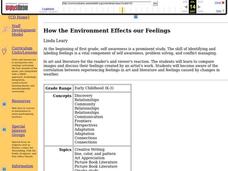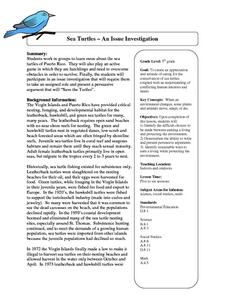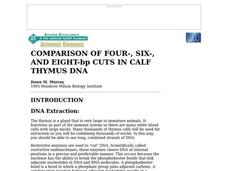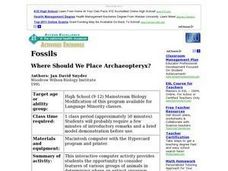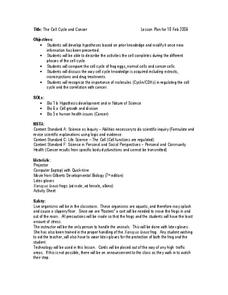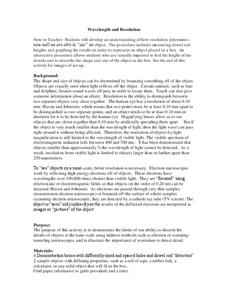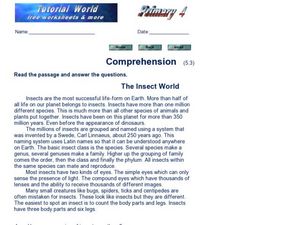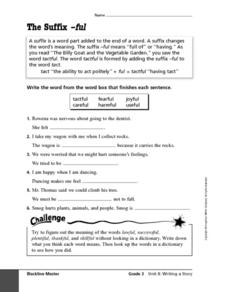Curated OER
How the Environment Effects our Feelings
First graders compare images and discuss their feelings created by an artist's work. They explore the correlation between experiencing feelings in art and literature and feelings caused by changes in weather.
Curated OER
Ancient History
Students investigate the concept of water usage and conservation. The differences between modern and ancient practices are considered. They conduct research into the economic and social characteristics of ancient civilizations like Egypt...
Curated OER
Sea Turtles: An Issue Investigation
Fifth graders explore sea turtles and the issues relating to them as endangered species. They research sea turtles on the Internet and find reasons why the turtles are endangered. They identify potential issues to be considered when...
Curated OER
Comparison of Four-, Six-, And Eight-bp Cuts in Calf Thymus Dna
Students investigate the use of restriction enzymes to recognize a four-, six-, and eight-nucleotide sequence. They utilize restrictive endonucleases to cut Thymus DNA and compare results by viewing the DNA fragments on Agarose Gel...
Curated OER
Where Should We Place Archaeopteryx?
Students classify Archaeopteryx using pictures of actual fossils and scientist representations of how the animal might have looked. They compare Archaeopteryx's characteristics to those of the five extant vertebrate groups to...
Curated OER
Contemporary Figure Heads
Students will compare historical figureheads to determine their purpose and meaning for the sailing vessels. They will use plaster to carve and create figureheads that are contemporary representations of themselves and their culture.
Curated OER
Journey of the Salmon
Third graders predict salmon migration routes and explore how dams affect the salmon migration. They explore the cultural significance of salmon to the Nez Perce people and design technology to aid salmon migration.
Curated OER
The Cell Cycle and Cancer
Learners compare and contrast the cell cycle of frog eggs, normal cells, and cancer cells. They watch a video about early development of the frog embryo, generate a hypothesis in small groups, and listen to a teacher-led lecture. ...
Curated OER
How Wet Can You Get?
Students visit a swimming pool and brainstorm different water sports and what benefits swimming has over other types of exercise. They then discuss buoyancy and water pressure and when how objects sink or float before playing a game of...
Curated OER
Insect Biology and Ecology: A Primer
Learners explore insects and closely related organisms. They examine the growth and development of a lady beetle. Students classify insects and organize them. They investigate pest management.
Curated OER
Chinese Lantern Festival - Social Studies
High schoolers explore the culture and heritage of their own and other groups. They explain ways communities celebrate New Year's. Students explore how and why individuals and groups pass on and sustain their culture and heritage. Pupils...
Curated OER
WALK, DON'T RUN
1. Bring two quarts of moist soil, a cake pan, a sprinkling can of water and a quart of grass clippings to class.
2. Share background material, and introduce the word "erosion."
3. Prepare a small model hill by mounding the soil in the...
Curated OER
Communication in Bees
Eighth graders identify and interpret a scientific investigation and a hypothesis through experimentation and testing a hypothesis. They identify what scientists hypothesized about the communication of stingless bees. Finally, 8th...
Curated OER
Wavelength And Resolution
Pupils perform a simulation of the workings of an electron microscope to discover that the resolution will need to improved to detect objects in the nano-scale. They use wooden dowels as detectors to determine the shape of objects in...
Curated OER
Reading Comprehension: The Insect World
In this comprehension worksheet, students read a non-fiction passage titled, "The Insect World" and complete 5 short answer questions.
Curated OER
The Suffix -ful
In this suffix learning exercise, students review the definition of a suffix and some example words using the suffix 'ful.' Students then write the word from the box that finishes the sentence.
Curated OER
Something's Fishy
Fourth graders identify parts of a fish. In this fish anatomy lesson, 4th graders identify parts of fish in a group setting and then complete a worksheet about the parts of a fish.
Curated OER
Walking Whales
Eighth graders explore the theory of evolution of whales. In this walking whales lesson students study a reading packet, divide into groups and respond to given questions.
Curated OER
Energy Defined
Fourth graders complete activities to study the sources of energy and forms. In this energy lesson, 4th graders discuss the origin of energy and define it. Students participate in several experiments to further study energy including a...
Curated OER
Introduction to Ecology
Eighth graders identify the living and nonliving components of an ecosystem. In this ecology instructional activity, 8th graders explain the role each organism plays. They participate in class discussion and answer a quiz at the end of...
Curated OER
Vertebrates And Invertebrates
In this science lesson, learners classify pictures into categories of vertebrates or invertebrates. After a class discussion, students divide into groups, and are given plastic baggies that contain photographs of each. The groups must...


